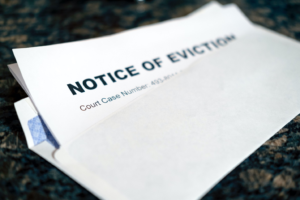The UK has a good portion of the population who live in rented accommodation. While this bodes well for the buy to let market, private landlords might face certain hurdles during the tenancy relationship. This is why understanding the legislation which governs occupation on an assured shorthold tenancy can help develop the relation for the long term but which can also make reclaiming property easier to deal with should the need arise to bring the relationship to an end.
Section 21 Notice
Section 21 under the Housing Act 1988 (as amended) is one of the foremost pieces of legislation determining a landlord’s right to to end the tenancy. A notice served under section 21 is commonly regarded as a ‘no-fault eviction’ notice as a landlord can serve this notice to bring to their tenant’s attention their need to end the tenancy and recover the property.
Whilst law makers have sought to simplify the procedure in some senses, there are now a far greater number of requirements which must be fulfilled by the landlord should their tenant fail to surrender the property and they are forced to commence formal recovery proceedings by way of the county court. There is a host of criteria but the most significant is the time frame a landlord must offer their tenant to find alternative accommodation before the court will consider the request to terminate the tenancy and pave the way for a bailiff to remove. Currently, a landlord must offer a minimum of two months’ notice from the date of service of ‘deemed’ service of the section 21 notice to the date after which they may commence court proceedings. This time frame must be set out clearly in the notice itself and adhered to accordingly. A failure to list the dates and allow the time frame to pass will render the notice defective and unenforceable.
Other requirements with respect to the drafting of the section 21 notice include that it is undertaken on the correct proforma and version. The notice cannot be served in the first 4 months of the tenancy and cannot be set for enforcement whilst the fixed term is still in operation.
The aforementioned aspects are commonly misunderstood and often force a landlord to re-serve the notice thereby suffering the lost time which had elapsed between service.
Here is some additional guidance when looking to draft and serve an enforceable section 21 notice.
Is the Tenant’s Deposit Protected?
The management of a tenant’s deposit is now inextricably linked with the process by which a tenancy is terminated under section 21. By Statute, a tenant’s deposit must be protected in a tenancy deposit scheme approved by the government within 30 days of its receipt. Moreover, the tenant must be served with the prescribed information detailing who the deposit is held with and give detailed instructions on not only how that deposit will be looked after but how it can be claimed by the landlord or recovered by the tenant at the end of the tenancy. The scheme will provide the bulk of the prescribed information although there is salient information which needs to be appended to the forms before they are served on the tenancy. . Failure to serve the prescribed information on a tenant in parallel to registering the deposit may also undermine the validity of the section 21 notice. It could also expose a landlord to a penalty of up to 3x the deposit sum if a breach of the legislation can be demonstrated.
Serve the Government’s Guide to Renting
For all tenancies which commenced after 1st October 2015 there is a need to demonstrate that the tenant has been serve with the government’s ‘How to Rent’ guide. A failure to serve the guide can undermine enforcement as it is requisite sought by the court when considering a request for possession. The court will seek a copy of the guide served to ensure the version corresponds with the timeline.
Ensure there is a drafted Tenancy Agreement and the Salient Information is accurate
Minor errors in the agreement can evolve into more complex problems during any enforcement stage. For example, it is essential that the names for the landlord and tenants are accurate and clearly stated in the agreement. This information should then marry with the salient information detailed in the section 21 notice. Any discrepancy between the named parties on the tenancy paperwork, the section 21 notice and the claim paperwork will almost certainly result in a hearing and could quite possibly result in a dismissal if it is found to have materially prejudiced the tenant’s position.
Fulfill Your Landlord Obligations
A landlord has certain obligations to fulfil, including providing the tenant with an Energy Performance Certificates (EPC) and Gas Safety certificates for the whole period covering the tenancy. The tenant must be served with a copy of the corresponding certificate or report once it has been completed by a qualified professional. A court will expect to see copies of these documents so it’s essential that you retain a copy and can aptly demonstrate service.
Check You Have Obtained the Required Licenses or Exemptions
Before serving the section 21 notice, make sure you’ve adhered to all the license requirements determined by the type of property of the local area. The local authority will guide you in this respect as they may deem the property a House of Multiple Occupation or have placed the property in a designated Selective Licensing scheme. Without the relevant license a section 21 notice will not be enforceable.
If this seems like a lot of work for you, hire a professional to handle these aspects for you to ensure peace of mind. At Landlord Assist, we have over 15 years of experience drafting action letters and send Section 8 notice and issue Section 21 notice to ensure a smooth and successful outcome during the tenant eviction process. With our help, you can take comfort that your notices are professionally prepared and valid for the purposes of enforcement should the need arise. We make tenants sit up and take note! Contact us today.







